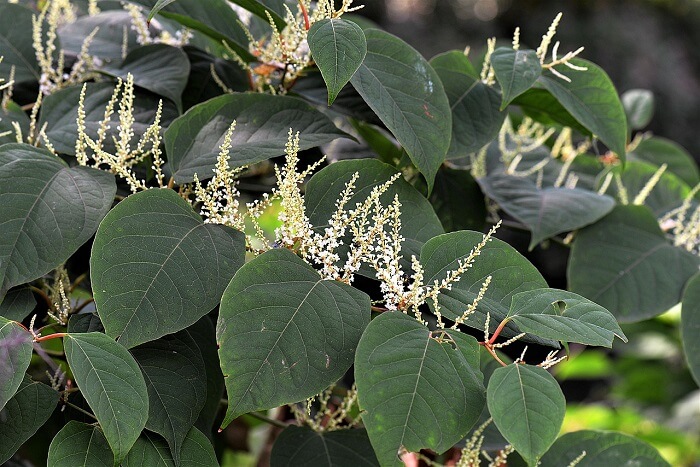Japanese Knotweed Growing In Neighbour’s Garden: Legal Implications
Dealing with a Japanese knotweed infestation can be a time consuming and exhausting endeavour, however, it can prove to be even more frustrating when the oncoming threat can be seen approaching from a neighbouring property. Dealing with Japanese knotweed in a neighbour’s garden is not a simple task and you may be limited as to what you can do, depending on how severe the infestation is.
Identifying Japanese knotweed in your neighbour’s garden can be distressing. However, unless the plant is encroaching on your land; besides having a conversation with them about the infestation, there is little that you can do about it. It is not illegal to allow Japanese knotweed to grow on your property, only if the plant is threatening to spread onto a neighbouring property can you take action to remove the plant.
We can answer your Japanese knotweed questions!
Talk To UsContents
Japanese Knotweed on adjoining land
Under UK Japanese Knotweed law, homeowners have a legal responsibility to ensure that Japanese knotweed does not spread onto adjoining neighbouring land. However, there is no legal obligation for any homeowner or landowner to inform anyone that knotweed is present on their land, they are also not legally obligated to remove or treat it. It is legal for adjoining land to have Japanese Knotweed present on their land, however they would be breaking the law if they allow it to spread.
The following guidance is intended to point homeowners dealing with a neighbouring Japanese knotweed threat in the right direction:
What to do if your neighbour has Japanese knotweed?
If your neighbour has Japanese knotweed, then you should tell them as soon as possible. If they do not arrange to have the Japanese knotweed treated and allow the Japanese knotweed to spread to your land, then you may able to bring a claim against them.
Does Japanese knotweed in my neighbour’s garden affect my home’s value?
Depending on the distance between the Japanese knotweed and your house, you may find that an infestation in your neighbour’s garden can have a negative effect on your house value. Property surveyors can often downplay or over-estimate this devaluing effect, so it can be difficult to understand where you stand. The amount of money that you stand to lose from being next door to a knotweed infestation depends on the severity of the infestation and how close it is to encroaching on your land.
We can answer your Japanese knotweed questions!
Talk To UsHow close does the Japanese knotweed need to be to my home to decrease its value?
As a general rule of thumb, a knotweed infestation will affect the value of your home if it is within 7 metres of your property. Not all surveyors approach this issue with the same severity, and you may find that some completely ignore the presence of knotweed on a neighbouring property altogether. Take a look at our Japanese knotweed UK map to see how close it might be to your home.
Will I be able to remortgage my home if there’s Japanese knotweed in my neighbour’s garden?
This depends on your mortgage lender, however, there have been some cases where lenders have refused to remortgage properties because there is a serious Japanese knotweed infestation on the neighbouring property. Whilst the government is currently looking into ways to soften the impact that a Japanese knotweed infestation has on home values, many mortgage lenders still operate a hands-off policy.
Can Japanese knotweed spread from one garden to another?
Japanese knotweed spreads quickly during the summer and can easily do so across house borders. Whilst the plant does not reproduce in the normal fashion, an extensive rhizome root system can extend up to 3 metres laterally. This means that a garden fence is little defence to an invasion from your neighbour’s garden.
What can I do about Japanese knotweed encroaching on my land?
If you live in England or Wales then you have a few options open to you if Japanese knotweed is encroaching onto your land from a neighbouring property. A Community Protection Notice is the best remedy in these scenarios, they force individuals causing a disturbance to others to remedy the problem. In this case, it would force a neighbour to take reasonable steps to keep their Japanese knotweed within their land, which can only be done by destroying it.
We can answer your Japanese knotweed questions!
Talk To UsHow do I get a Community Protection Notice to stop my neighbour’s Japanese knotweed?
In order to secure a Community Protection Notice from your local authority you’ll need to prove that you’ve informed your neighbour of the issue, this can be via a letter or email, but a well-mannered conversation is usually the best way to start the process. If your neighbour does not take reasonable steps to act on the problem, you can then move forward with securing a Community Protection Notice to force them to do so.
What if the Japanese knotweed is growing on public or council-owned land?
The same Japanese knotweed laws apply to growing on publicly owned land as it does to privately owned land. If there is a knotweed infestation encroaching onto your property from neighbouring publicly owned land then you should be able to get the authority responsible for the land to remove the offending plant. Similarly, if the knotweed has led to a depreciation in your home’s value then you should be able to claim compensation against those responsible for allowing the plant to spread onto your land.
What if Japanese Knotweed is growing in a neighbouring property owned by a business?
The laws governing the control of Japanese knotweed apply to organisations, as well as individuals. If there is a Japanese knotweed infestation on neighbouring property owned by a business you will still be able to follow the same legal recourse. A Community Protection Notice can be served against a business and, should the knotweed encroach onto your land, you should be able to make a claim to cover the treatment costs and damage to your house value.
Is it my neighbour’s responsibility to remove the Japanese knotweed?
Property owners have many responsibilities when taking on new land, amongst these is the requirement to keep any invasive plants in check, such as Japanese knotweed. If the knotweed originated on your neighbour’s property then it is their responsibility to remove it, especially if it’s encroached onto your land.
We can answer your Japanese knotweed questions!
Talk To UsHow can I solve a Japanese knotweed dispute with my neighbour?
There are some cases where it is not clear where a Japanese knotweed infestation has originated from. Shared gardens or land with ill-defined borders can lead to disputes between neighbours as both parties attempt to shift responsibility for removing the Japanese knotweed. In these instances, mediation is often required to reach an understanding between both parties and move forward with a treatment plan that is suitable for both.
Can you sue your neighbour for not controlling their Japanese knotweed?
In early 2018, Adam and Eleanor Smith successfully sued Rosemary Line for allowing Japanese knotweed to grow onto their property. After selling the Smiths their family home in 2002, Mrs Line retained ownership of land that bordered the property. In the years following, the Smiths discovered Japanese knotweed spreading into their land from Mrs. Line’s land which she refused to treat.
The knotweed infestation caused the value of the Smiths’ home to drop by 10%, leaving them no further recourse but to take Mrs Line to court. Although Mrs Line contended that the knotweed had existed before the Smith’s arrival, she was still found to have failed to prevent the spread of the plant from her neighbouring land to the Smith’s home.
Mrs Line will now have to commit to a 5-year treatment plan with a recognised expert who will provide an insurance backed guarantee, in order to clear both properties of the infestation – this has provided an important precedence and serves as a clear warning to property owners who choose to neglect the spread of knotweed on their land.
Can I force my neighbour to pay for the removal of the Japanese knotweed that has spread into my garden from theirs?
The precedent set in the aforementioned case of Smith v Line means that in the event where a Japanese knotweed infestation from a neighbouring property has negatively affected the value of your home then you should be able to force them to pay for the treatment plan.
If either of these cases sounds familiar or you’d like guidance on your own Japanese knotweed problem, then don’t hesitate to contact us using the adjacent contact form or call us direct on 07595 653 226.

